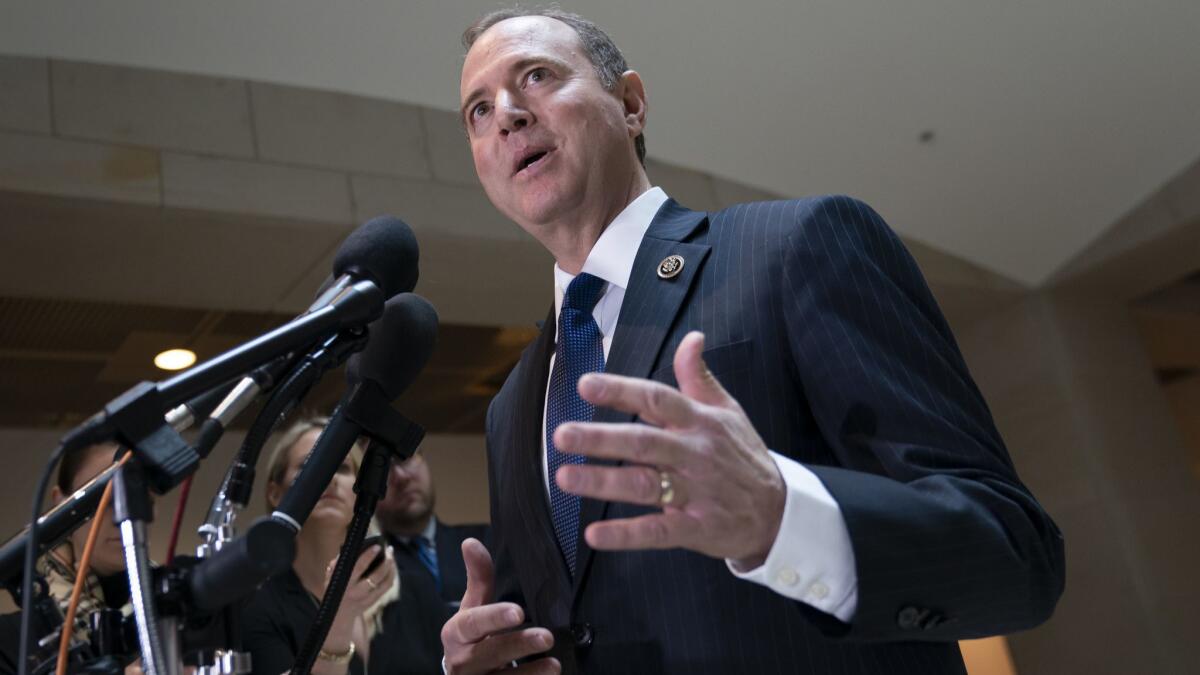Editorial: Investigating Trump should be a bipartisanship affair

In his State of the Union address, President Trump called for Democrats and Republicans to “embrace the boundless potential of cooperation, compromise and the common good.” But that appeal came with a catch: Democrats who now control the House must not conduct “ridiculous partisan investigations” of his administration. “If there is going to be peace and legislation,” Trump said, “there cannot be war and investigation.”
The president’s demand is not only unreasonable, given the lingering questions about possible Russian influence over his campaign and his administration, it’s also hypocritical.
Trump didn’t object when Rep. Devin Nunes (R-Tulare) and other Republicans on the House Intelligence Committee essentially operated the panel as a public-relations arm of the White House. But now that the committee is headed by Democrat Adam Schiff, who has reopened and expanded the committee’s Russia investigation, Trump is crying foul.
That ambitious agenda is justified and overdue, but it’s also potentially explosive politically.
On Thursday he tweeted: “So now Congressman Adam Schiff announces, after having found zero Russian Collusion, that he is going to be looking at every aspect of my life, both financial and personal, even though there is no reason to be doing so. Never happened before! Unlimited Presidential Harassment.”
Actually, the committee isn’t planning to examine “every aspect” of Trump’s life. But Schiff has made it clear that it will explore a variety of questions, including some related to the president’s finances (a subject Trump once declared to be a “red line” that investigators must not cross).
That ambitious agenda is justified and overdue, but it’s also potentially explosive politically. For that reason, it’s important that the committee under Democratic control not be perceived as being simply the mirror image of Nunes’ partisan operation, dedicated to discrediting the president instead of defending him. Nor should its investigation be framed as a dry run for impeachment.
Schiff has said the committee’s investigation would focus principally on “five interconnected lines of inquiry”: what the Russian government has done to influence U.S. elections and how the U.S. government has responded; the extent of any links or coordination between Russia and figures in Trump’s orbit; whether any foreign actor has sought or holds any kind of leverage over Trump or his associates; whether Trump or his associates are or were vulnerable to foreign manipulation, or ever sought to shape U.S. policy to advance foreign interests; and whether anyone has tried to obstruct investigations into these matters.
This suggests a dramatically more aggressive inquiry than the Republican-led House investigation, which reported last year that it had found “no evidence that the Trump campaign colluded, coordinated, or conspired with the Russian government.” (In a dissenting report, Democrats claimed that the majority failed to call key witnesses and request pertinent documents, omissions the new majority presumably will seek to rectify.)
Perhaps the two most significant themes are the emphasis on Trump’s business affairs and the focus on Trump’s presidency, not just his campaign.
Schiff persuasively argues that these lines of inquiry fall squarely within the committee’s counterintelligence mandate and that pursuing them is justified by evidence in the public record. That includes information about Trump’s financial interest in Russia. For example, discussions over a possible Trump Tower in Moscow apparently went on well past the time when former Trump lawyer Michael Cohen told the committee that they had ended. (Cohen pleaded guilty to lying to Congress about that issue.)
Enter the Fray: First takes on the news of the minute »
The public’s interest in these issues is clear. A president shouldn’t be influenced in his policy decisions by his financial pursuits; it’s legitimate for Congress to ask if that is the case with Trump.
The challenge for Schiff and the Democrats is to pursue their inquiry in a way that makes it hard for Trump or his supporters to dismiss it as partisan “presidential harassment.” Schiff says that it appears that Republicans on the panel will rejoin the investigation, though he says he’s not sure whether they would be doing so in good faith. He should do his best to conduct the investigation in a way that will win the cooperation of some Republicans and restore the bipartisanship that used to prevail on the committee.
The questions that Schiff has teed up for the committee are serious. Republicans as well as Democrats should be interested in the answers.
Follow the Opinion section on Twitter @latimesopinionand Facebook
More to Read
A cure for the common opinion
Get thought-provoking perspectives with our weekly newsletter.
You may occasionally receive promotional content from the Los Angeles Times.










